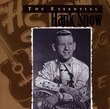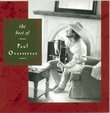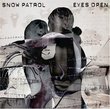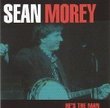| All Artists: Lenny Bruce Title: Live at the Curran Theater Members Wishing: 6 Total Copies: 0 Label: Fantasy Release Date: 8/24/1999 Album Type: Live Genres: Special Interest, Pop Styles: Comedy & Spoken Word, Poetry, Spoken Word & Interviews Number of Discs: 2 SwapaCD Credits: 2 UPC: 025218430128 |
Search - Lenny Bruce :: Live at the Curran Theater
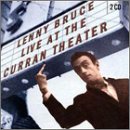 | Lenny Bruce Live at the Curran Theater Genres: Special Interest, Pop
Once Lenny Bruce had amassed legal troubles, he turned a corner, going from standup performer doing funny, if acerbic, routines (which is more than being simply a comedian) to being a free-improvising social commentator. H... more » |
Larger Image |
CD DetailsSynopsis
Amazon.com Once Lenny Bruce had amassed legal troubles, he turned a corner, going from standup performer doing funny, if acerbic, routines (which is more than being simply a comedian) to being a free-improvising social commentator. Here is the first CD reissue of Bruce's 1961 show at the Curran Theater in San Francisco. It's a direct rerelease of the three-LP set issued a decade after the show, a half-decade after Bruce's overdose, and it's a fantastic experience. Bruce sounds breathlessly overrun as the show starts, trying to distill his San Francisco bust into something cohesive. Of course, Bruce's technique includes turning away from the microphone, interrupting himself, fracturing his own narrative, and drawing his verbal loops ever wider. Bruce is able over these two-plus hours of narrative to cover a wealth of topics, from his Philadelphia bust and the court system's persecution of his performances to a wealth of historical figures. His style at the Curran remains difficult to absorb, full of solipsism, elliptical thought, recreated conversations with interlinear commentary, and more. Wondering whither the roots of performance narrative à la Spalding Gray, Eric Bogosian, and David Sedaris? Here they are. --Andrew Bartlett Similarly Requested CDs
|
CD ReviewsLenny Bruce is not afraid... linux_rocks | 01/14/2001 (4 out of 5 stars) "Rapidly running out of Bill Hicks material (he's left the building) I heard about Lenny Bruce by association and though I'd try this guy out.I wasn't disappointed. You're immediately drawn in by his intimate story telling style. Public intimacy (from outside the tribe) - Lenny Bruce is not afraid and "just wants to cook" and "free-forms it all the way" whaling out concepts as quick as he clicks his fingers and snaps his Tom McCann shoes. He has a distinct northern talking tempo, man, you know, no southern drawl here daddy-o. "I see things in a ludicrous sense and I report on that kind of a scene." A useful trait for the non-trivial events that were to follow. Lenny hilariously describes the story of the cop bust when he was laid low sick. He quips: "I call for the heat and here they are!" Even putting on his shoe becomes comic ammunition: "Did you know that if I'm not involved in it this shoe takes 40 minutes to get on?" They eventually carry him away in a stretcher having to surreally prop him up vertically in the elevator thereby giving Lenny a perfect position to observe the workings of the "Combine" as Ken Kasey's Chief Bromden would say. They even have a crash on the way to the station! Lenny tells how it is changing vocal tone when necessary to invoke the characters and linking into his fantasy sequences with strings like: "...this would be beautiful, dig..."The subsequent "language" trials that follow come complete with the proverbial outdated parochial judge, "assimilated into nothingness" juries and bribery. Lenny has a field day and just "plays it for laughs" exposing the usual corruption and makes media headlines. But that's not his purpose: "My stick is not to thwart authority - that's just a dumb generality." All that Lenny ever wanted to do was expose the "lie" as he saw it of "respectability". It's a theme that he keeps coming back to time and time again in this gig. "Respectability is - keep it under the covers." "So when I see the lie - I don't want it to be that way." This remarkable honesty on stage allows him to easily capture the essence of his time. His "Jewish-Goyish" deconstructions (especially of the sexual attitudes of his contemporaries) are full of insight as well as wit. It's as if he's standing back from society and saying: "Who the hell sets these dumbo rules anyway?" In fairness to his material though it does require some effort from a young crew. His mentioning of well-known 1960s characters reminds us of time and place: "I cannot equate Jimmy Dean and Chubby Checker, no, I'm 36 and I'm out if it..." But other references are more difficult to place: "Alexander King - you junkie Mark Twain", "Hugh Downsey - obsequious, over salacious toches-lecker." I wonder who were these zhlobs that Lenny spoke so highly of ;-) Which reminds me, Bruce litters this 2-hour plus flow-of-consciousness gig with Yiddish phrases all over the joint. Mitten drennen (suddenly) he'll shlep (drag) himself up to the microphone and spritz (speak) words like naches (happiness) and gelt (money) frequently, but when Lenny talks about his critics you will hear the well known putz and schmuck creep in, and when he really wants to kvetsh (complain) he'll geshrei (holler) on about zhlobs (rude and crude people) and even the odd toches-lecker (ass licker)! It's enough to drive a goy mishigeh!When I first heard about 'legendary' Lenny Bruce the so-called "dirty Jew" I thought I would never be able to appreciate his humor, thinking him way too far before my time. I was happily mistaken. "Is this funny?" asks Lenny at the very beginning. Yip, it sure is. Granted, some effort is required to fully dig this persecuted, suppressed, bi-lingual, ad-libbing, comic man-of-his-times in this his Curran Theatre tour de force of free-flowing consciousness. He's well worth it though. His addictive, truth telling, damn the begrudges, no fear style brings you back for more, each pass uncovering new structure and comedy. A perfect mirror on the 1960's reflecting even today. Take him or leave him at the very least he's funnier than Joyce! You know I'm still trying to figure out how to pronounce "Byhre" - Goyish or what...;-)" Lenny, We Miss You Stewart Axelrad | San Antonio, Texas United States | 11/25/2000 (5 out of 5 stars) "I remember buying this recording as an LP, approximately 25 years ago; I had heard of Lenny Bruce, his notoriety and his courage. I also remember listening to the LP for the first time and being somewhat non-plussed. This was comedy? I couldn't understand half of what Lenny was saying, he spoke so fast and used so much hip and Yiddish argot, that I missed much of the satiric bite of his routines (I was only 20 at the time).Since then, I have listened to this extraordinary concert over 100 times (easily) and was overjoyed when the CD was finally released. The Curran Theatre concert was fueled by a white-hot anger, resulting from Lenny's two busts (one for obscenity, one for drugs) in the months just prior to this show. As a result, Lenny throws off all restraint and attacks the hypocrisy of society, full-tilt boogie. The opening bit, in which Lenny cracks that the only way he could fill the house (only 100 people actually showed up) was to offer free whiskey to the local winos, in classic and hilarious. From there, he gives a blow-by-blow description of the two busts, complete with great characterizations of the judges who tormented him. He also indulges in a fantasy, wherein he exacts a poetic revenge on one of them.Throughout the show, he indulges in free-form snatches of his classic bits, such as "Christ and Moses" and "Las Vegas T & A". Some of the humor is referencial to current events of the day, and thus somewhat oblique at times, but it presents a marvelous slice of life in the early 1960's. The final bit, in which Lenny gives his take on Judy Garland, is worth the price of the CD alone. There was always much more to Lenny Bruce than just a "dirty comic"; he was probably the greatest social satirist of his generation,and he paid a horrible price for it. Sadly, no one has emerged to take his place (perhaps no one could) since his death in 1966. In this era of "political correctness", we need someone like Lenny more than ever.In conclusion, it is interesting to compare the Carnegie Hall concert (also available on CD) with this recording, in terms of tone. For my money, both are seminal recordings for any Bruce collector; however, Carnegie Hall presents us with a humorist at the height of his popularity, before the bad times. Less than a year later, Curran Theatre displays the bitterness of a man who feels that he been wronged by society, both in terms of principles and his own persecution. Listen to how Lenny fights back with the only weapon he has: humor. It is tragic that he did not continue to adopt this strategy in his later years. Lenny, you left us much too soon." Brilliant leper2000 | 09/10/2000 (5 out of 5 stars) "I first saw the name Lenny Bruce on the sleeve of a book in my father's library. I was ten and all I remember of the incident was the cover shot of Lenny Bruce with those Billy Joel eyes. At any rate, I was reminded of that scene when reading certain passages from Don DeLillo's Underworld last year, illuminating the author's vision of Lenny Bruce on stage toward the end of his life. I'll get to the point soon I promise. But lemme go ahead and preface this with the fact that I'm only 24; Bruce was long since dead before I was born, a year and a day prior to the death of Elvis. But enough about me.This recording offers the young person a great window from which to surreptitiously view the state of culture and the times of the early 60's. I grew up on Diceman and Bobcat Goldthwait tapes that seemed very much informed by Woody Allen bits, or schtick; don't expect that here. The Lenny Bruce evidenced in this recording has no rules, it follows no guidelines; it is the spritz style of comedy. After listening you will recognize his influence on so many others, Jackie Mason's jews and gentiles routine is a direct lift from Bruce's jewish and goyish spritz. Howard Stern's extremely personal, anything goes, boulliabase style of radio seems heavily influenced by Bruce's nothing sacred style. Bruce discusses himself, for instance his law problems and his jewishness, politics, for instance RFK's preoccupation with the mafia, and comedy itself with no fear. He'll have the crowd eating from his hand and then he'll say something that totally alienates them. He contradicts himself. He invents new syntax. He deals with issues like race and segregation, at a time when those issues really mattered, without being ponderous, heavy handed or preachy. In an age of Jerry Seinfeld and Jeff Foxworthy cd's, and Spike Lee filming black comedians whose schtick is still based of the tried and true Def comedy jam formula of "white folk do this, while black folk do that," it's really something else listening to Lenny Bruce. Don't expect to laugh every two seconds, just keep your ears open and learn."
|

 Track Listings (3) - Disc #1
Track Listings (3) - Disc #1